Coconut has many health benefits, coconut water can be used as an alternative to Oresol solution in treating dehydration due to diarrhea. However, some groups of people should limit their intake of coconut water.
Coconut is a familiar fruit in tropical and subtropical countries, with many uses such as: food, fuel, cosmetics, folk medicine and some other uses, so in some countries coconut is also called “tree of life”.
Coconut is a very special fruit. When the coconut is young, it contains a lot of water and has a very thin, soft and quite clear flesh. When the coconut is old, the coconut water will decrease and be replaced by coconut flesh and air.
1. What are the effects of coconut?
Coconut water is a natural, clear, sweet drink that provides very little energy (19 calories/100g), and contains no fat. In addition, coconut water is rich in vitamins such as B3, B5, biotin, B2, folic acid, small amounts of vitamins B1 and B6, vitamin C and minerals such as sodium, potassium, copper, calcium, iron, manganese, magnesium and zinc. In addition, coconut water also contains amino acids, biological compounds such as cytokinin and enzymes such as acid phosphatase, catalase, dehydrogenase, peroxidase, polymerase…
Usually, for coconut to have drinking water, the coconut must develop for 5-7 months on the tree, if the time is less than 5 months, the coconut water is often bitter and has no nutrients. An average coconut can contain 200-1000ml of water depending on the type and size of the tree.
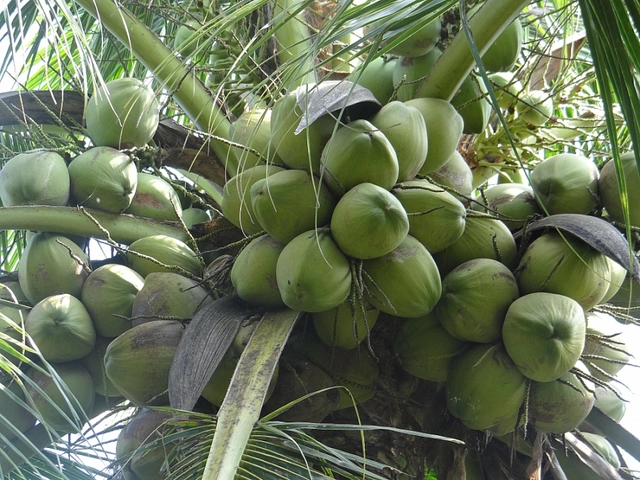
Coconut
Young coconut water contains free L-arginine amino acid
Free L-arginine amino acid in coconut water has the effect of significantly reducing the harmful effects of free radicals. In addition, vitamin C in coconut water also has the effect of reducing lipid oxidation in the body.
Young coconut water helps control blood sugar
Many studies have shown that drinking coconut water regularly can reduce blood sugar levels and stabilize blood sugar before and after meals. In addition, with a high magnesium ratio, coconut water also increases the sensitivity of insulin receptors to help control blood sugar in both pre-diabetic and diabetic people.
Coconut water helps prevent kidney stones
Drinking enough water and drinking properly is a very important solution to prevent kidney stones. Do not wait until you are thirsty to drink and drink water regularly, sip by sip. Some studies have shown that coconut water helps reduce the risk of kidney stones by reducing the formation of calcium and oxalate crystals… that cause stones.
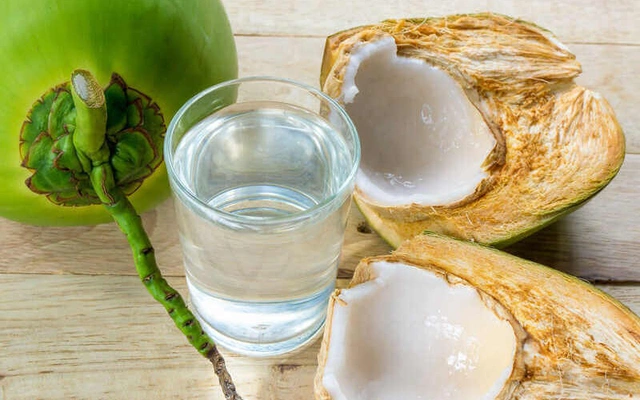
Young coconut water
Coconut water is good for the heart and reduces blood pressure
The ingredients in coconut water contain L-arginine, vitamin C, calcium, magnesium, potassium and other minerals that help reduce cholesterol, triglycerides, LDL, VLDL and increase HDL in the intestines to help reduce plaque formation.
Research has shown that cytokinins (kinetin and trans-zeatin) in coconut water have the effect of preventing blood clots that cause blood vessel blockage, preventing the risk of myocardial infarction or stroke. According to this study, cytokinins also have the effect of anti-aging skin and preventing cancer.
Coconut water helps replenish water and electrolytes
Coconut water is a drink containing glucose, electrolytes and minerals that are very suitable for improving dehydration in the body. Coconut water can help treat dehydration caused by diarrhea for any reason such as dysentery, cholera or acute diarrhea. According to the World Health Organization (WHO), coconut water can be used instead of Oresol solution in the treatment of dehydration due to diarrhea.
In addition, many studies have shown that coconut water is also a drink that helps replenish and restore electrolytes better than normal water when exercising or doing prolonged physical activities.
Coconut water helps increase metabolism
Nutrients in coconut water such as enzymes, B vitamins, vitamin C, manganese and copper have been shown to help improve digestion and enhance the metabolism of protein, sugar and fat in the body.
Coconut water is good for pregnant women and infants
Vitamin B9 (Folate) is essential for cell differentiation and development, red blood cell production, especially in infants and pregnant women.
The above effects of coconut are for reference only, people with chronic diseases such as diabetes, blood pressure, kidney stones should consult a specialist if using too much.
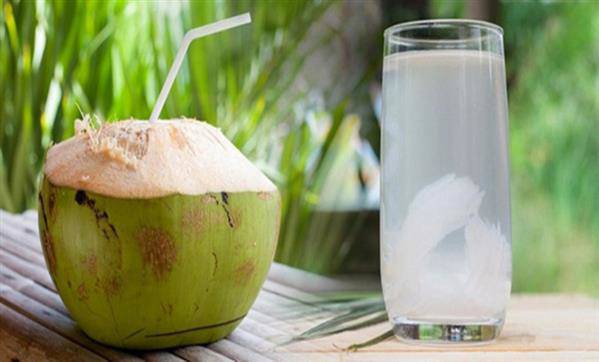
Coconut water can be used as an alternative to Oresol solution in the treatment of dehydration due to diarrhea.
2. How much coconut water should adults, children, and the elderly drink?
Although coconut water has many health benefits, this drink should not be abused. Young coconut water is better than old coconut water because young coconut water contains less sugar, does not affect blood sugar much, and does not cause overweight.
For adults, coconut water should only be considered a soft drink and should not drink more than 1-2 coconuts/day. Coconut water should not be drunk daily for a long time or too much can cause electrolyte disturbances and affect muscle function.
In addition, people with low blood pressure, recent surgery, or other medical conditions such as kidney disease, high blood potassium, etc. should consult a nutritionist before using coconut water.
In Western countries, coconut water is considered a recommended food for young children and breastfeeding mothers because coconut water contains a compound called monolaurin that helps boost immunity and protect children from colds, flu and infections.
Coconut water brings many benefits to children, with some characteristics such as being low in calories, cholesterol-free, rich in potassium, rich in fiber to help reduce constipation and aid digestion, helping to replenish the amount of salt lost when children have diarrhea. However, to ensure safety, consult your doctor before giving your child coconut water. Because, for children under 6 months old, breast milk is the most important and only source of nutrition needed for children.
For older children, when you first start giving them coconut water, give them fresh coconut water in a small amount, about 50ml, and continue for a few days to check if the child is allergic to coconut water or not? If your child does not have an allergic reaction, you can incorporate coconut water into their diet.
Note that you should not give your child coconut water every day. For children, a nutritious and varied diet is very important for their development, because their stomachs are small, if they drink too much coconut water, they may feel full and eat less.
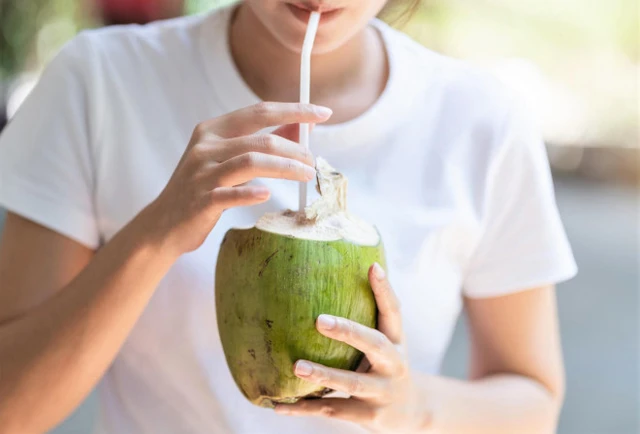
For adults, coconut water should only be considered a soft drink and should not drink more than 1-2 coconuts/day.
3. Can people with fever or cold drink coconut water?
Fever is a common condition and can occur at any age. When having a fever, the body will feel tired, lose appetite, have headaches, muscle aches, feel cold and especially dehydrated. Therefore, replenishing water is very important when having a fever.
Coconut water is 95.5% water, the rest is vitamin C, vitamin B, iron, phosphorus, sodium, potassium… In which, potassium helps the body retain water to avoid losing water to the environment, vitamin C has the effect of strengthening the immune system to help people with the disease recover faster. Therefore, it is completely possible to drink coconut water when having a fever to compensate for water and electrolytes lost due to fever, vomiting, diarrhea or sweating causing severe dehydration.
According to today’s modern medical perspective, there is no recommendation on whether people with colds should drink coconut water or not. However, for those who are suffering from a cold or feeling cold, drinking coconut water can increase the feeling of fatigue and chills.
4. Benefits of coconut meat
Unlike coconut water, coconut meat is very rich in energy, 100g of coconut meat provides 354kcal, mostly from fat (33.49g) and carbohydrates (15.23g). Although coconut meat has a high saturated fat content (29.698g – nearly 90% of fat) unlike other nuts rich in unsaturated fat. But coconut meat has many bioactive compounds that promote health.
The saturated fatty acid in coconut is lauric acid, which increases the concentration of good HDL-cholesterol in the blood. Coconut meat also contains the same vitamins and minerals as coconut water, but the difference is that coconut meat also provides vitamin E, vitamin K and selenium.
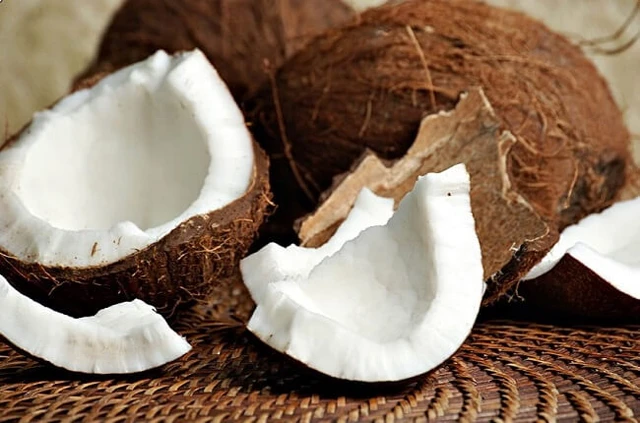
Coconut meat
Coconut meat contains many fatty acids
Medium-chain fatty acids in coconut meat such as caprylic acid, capric acid, lauric acid, palmitic acid, steraic acid, oleic acid, linoleic acid, etc. are absorbed directly in the intestine and sent to the liver to produce energy. Therefore, these medium-chain fatty acids do not participate in the transport and formation of cholesterol. In addition, lauric acid has also been shown to increase HDL cholesterol, helping to reduce the risk of heart attack or stroke.
Coconut meat supports weight loss
Studies show that medium-chain fats in coconut meat have the effect of increasing the feeling of fullness, thereby limiting the amount of food intake into the body.
High in fiber
Coconut meat contains a lot of fat, so it can help the body absorb fat-soluble vitamins such as vitamins A, D, E, K. Coconut meat also contains a lot of fiber, so it can help the digestive system prevent constipation.
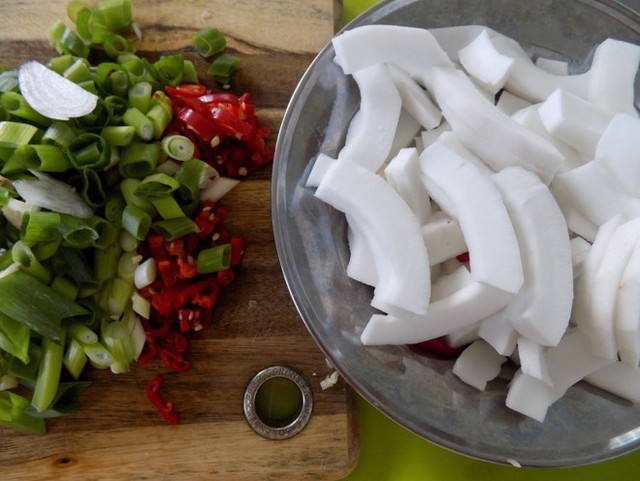
Coconut meat is rich in energy.
Support immunity
The medium-chain fats in coconut: lauric acid, caprylic acid, capric acid or myristic acid are known for their strong antibacterial and antiviral effects. These substances have the effect of destroying bacteria or viruses with lipid membranes by decomposing this protective layer. For example, this fat can fight bacteria that cause stomach ulcers, sinusitis, bacteria that cause tooth decay, urinary tract infections, etc.
On the other hand, monoglycerides, especially monolaurin in coconut oil, have the effect of preventing the growth of E.Coli bacteria, Pseudomonas aeruginosa, Staphylococcus aureus and Candida fungi.
Coconut pulp contains lauric acid
Lauric acid is a medium-chain fatty acid, accounting for more than 50% of the total fatty acids in coconut oil. And according to studies, this acid can help reduce memory loss or reduced brain function in people with Alzheimer’s disease.
5. Who should not eat coconut meat?
Coconut meat is a food rich in saturated fat, but coconut fat has been shown to increase the concentration of good cholesterol HDL and reduce the concentration of bad cholesterol LDL in the blood.
However, you should not eat coconut meat every day because it can increase the risk of overweight, obesity and other metabolic diseases. In addition, due to the abundant amount of fat and fiber, eating too much coconut meat can cause bloating and discomfort.
You should only eat coconut meat 1-2 times/week and people with asthenia syndrome, poor digestion, pregnant women, people with diabetes, dyslipidemia, obesity, atherosclerosis, cardiovascular disease should limit eating coconut meat.





